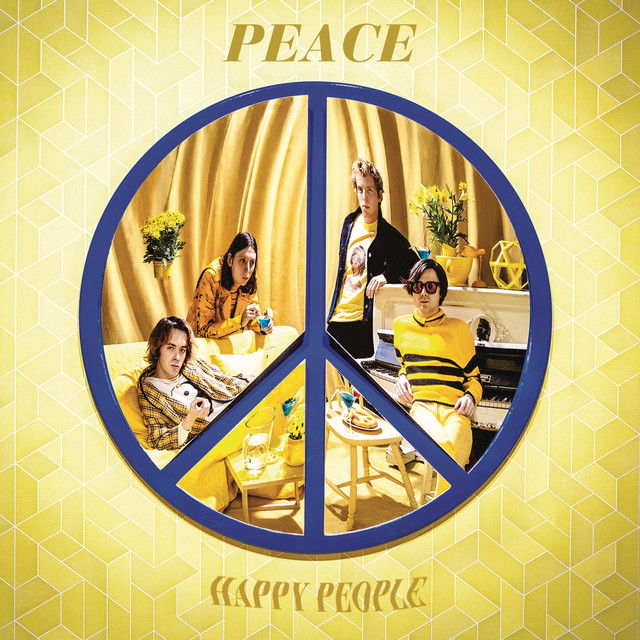Song Stories: Peace: World Pleasure
Emerging from Birmingham’s vibrant B-Town scene in the early 2010s, Peace quickly became one of the most talked-about indie bands of their generation. Known for blending jangly guitar hooks with shimmering, youthful idealism, they captured the restless energy of a post-Arctic Monkeys landscape while flirting with Britpop revivalism and festival-sized anthems. Their 2015 album ‘Happy People’ cemented their status as leaders of the scene, but beneath the polished surfaces, the band was grappling with a growing frustration, both with the culture around them and their own place within it. ‘World Pleasure’, the album’s sprawling, seven-minute closer, stands as a pivotal moment in their catalogue.
At nearly seven minutes long, ‘World Pleasure’ closes ‘Happy People’ not with a whisper, but with a funk-infused manifesto. It’s a bold, sprawling finale to a record that otherwise leans on Britpop revivalism and indie rock charm, but this final track throws that template aside completely. Where the rest of the album offers sharp, melodic guitar lines and radio-friendly hooks, ‘World Pleasure’ opens up into something messier, looser, and infinitely more daring. It’s indulgent, it’s chaotic, it’s brash and that’s exactly the point. As the final track, it feels less like a neat sign-off and more like the moment the band rips the whole thing apart, stepping outside of their own record and sneering at the walls they’ve built.
Much of ‘Happy People’ taps into a love for classic British guitar music. The album carries echoes of the Stone Roses, Blur, and even flashes of Bowie’s sharper, funkier edges. Peace walk a fine line between irony and sincerity throughout the album—blending social commentary with bright, infectious melodies. Songs like ‘Lost on Me’ and ‘Money’ flirt with clean-cut, hook-driven pop, while deeper tracks like ‘Under the Moon’ and ‘Someday’ lean into dreamy introspection. But beneath the gloss, there’s always a tension a sense that the band is wrestling with what it means to be happy, to be young, to be awake in a world that sometimes feels flat and over-processed. ‘World Pleasure’ doesn’t wrestle with that question. It kicks the door open and dances through it.

By the time ‘Happy People’ arrived in 2015, Peace were one of the defining names in the B-Town scene the loose, swaggering collective of Birmingham bands that also included Swim Deep, Jaws, and Superfood. B-Town wasn’t so much a movement as it was a moment, a self-aware slice of indie culture that combined baggy, sun-drenched guitars, with a very distinct sound. It was born out of a post-Arctic Monkeys Britain, where indie bands were either chasing chart success or consciously stepping away from it. Peace occupied an interesting middle ground—they wanted to make big, ambitious music, but they also seemed deeply suspicious of the spotlight. The B-Town scene celebrated escapism, but it also reflected a gnawing disaffection something ‘World Pleasure’ embodies perfectly.
Penned by frontman Harrison Koisser, ‘World Pleasure’ is less a song than a controlled detonation. It opens with a thick, slinking bassline reportedly inspired by the hyper-melodic funk of Flea from Red Hot Chili Peppers that doesn’t so much invite you in as it drags you along. It’s a groove that feels sweaty and immediate, but there’s a roughness to it, a sense that it could fall apart at any moment. Quickly, the track bursts into layers of saxophones, guitars, and Koisser’s semi-rap vocal that sneers and stumbles through lines that are part social satire, part existential panic. It’s a sound that owes more to Talking Heads and the Red Hot Chili Peppers than to Peace’s usual Britpop lineage. In fact, it’s almost as if Peace are deliberately stepping outside the indie toolkit to craft something bolder, something that feels alive and imperfect.
Koisser’s lyrics are a jagged mix of sarcasm and sincerity. He throws out lines like "Please don't send me off to war/That's not what my body's for." with a delivery that feels simultaneously cocky and hollow, as if he’s mocking the empty mantras of a generation obsessed with self-image and surface-level gratification. The track doesn’t build toward a neat resolution. Instead, it spirals. Even as the groove thickens and the layers stack up, the band somehow keeps it from collapsing into noise. Doug Castle’s guitar shifts between sharp, scratchy funk riffs and wild, spiraling leads, while Sam Koisser’s bass never lets go of that seductive pulse. Dom Boyce’s drumming is tight but unpredictable, holding everything together while threatening to unravel it. The beauty of ‘World Pleasure’ is that it always feels like it’s one step away from losing control, it never does, it always tows the line perfectly, and showcases the bands talent for creating perfect pieces of pop music.

Peace made a noticeable shift in direction on their second album, exploring themes that felt worlds apart from their debut. ‘In Love’ was all swagger and youthful excess, brimming with self-confidence, but ‘Happy People’ comes from a place of deeper reflection. There’s more angst, more uncertainty, and a growing sense that the band has started to understand the weight of the world around them. Yet, that tension is carefully wrapped in bright, buoyant indie pop. On the surface, it sounds joyful, but the lyrics peel back the gloss to reveal something far more complex. On the jaunty ‘Perfect Skin’, Harry Koisser’s self-deprecating desire to be “as gorgeous, as stylish, as rich” feels both vulnerable and bitingly satirical, especially when he punctures the hollow materialism of the postmodern world with the brilliant line: “where bitcoins pay for beatings, and diamonds pay for girls.” Even the love songs are laced with unease. In ‘Lost on Me’, the girl is “chemically so heavenly,” a line that suggests addiction and obsession rather than pure romance, while the track’s slick house-inspired pulse pulls Peace’s indie pop into effortlessly danceable territory.
The whole album marked a bold step away from their jangly indie roots, and over a decade later, it still stands tall. When revisiting reviews from the time, one line from The Independent really stuck: “It’s like listening to peak-period Oasis, but with the snarls replaced by smiles.” It perfectly captures an album packed with gigantic songs, tracks that shine with pop exuberance but pulse with the growing pains of early adulthood.
Around this time, Peace were genuinely one of the best bands in Britain. ‘World Pleasure’ is just one of their brilliant moments, but it’s the one that fully crystallised their ambition. The self-proclaimed ‘Gen Strange’ band crafted one of the finest records of the 2010s not by chasing fame and fortune, but by trusting their instincts. This group of unlikely twenty-somethings from the post-industrial heartlands around Birmingham created something extraordinary by leaning into their guts, their record collections, and their fearless ambition.